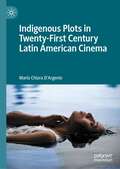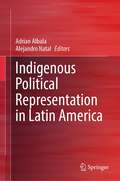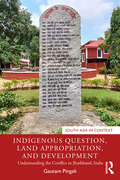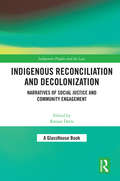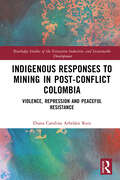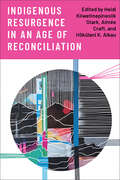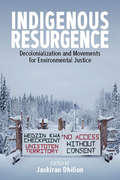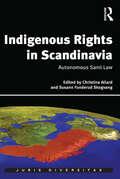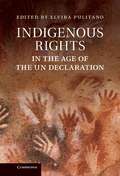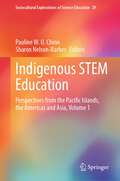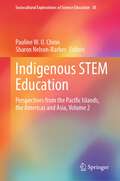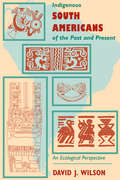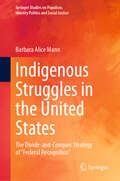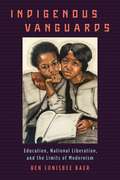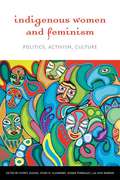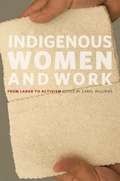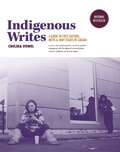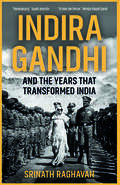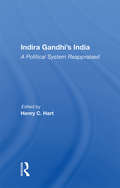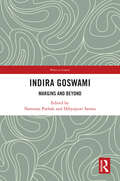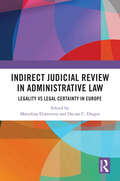- Table View
- List View
Indigenous Plots in Twenty-First Century Latin American Cinema
by Maria Chiara D'ArgenioIn this engaging book, Maria Chiara D’Argenio delineates a turn in recent Latin American filmmaking towards inter/cultural feature films made by non-Indigenous directors. Aimed at a global audience, but played by Indigenous actors, these films tell Indigenous stories in Indigenous languages. Over the last two decades, a growing number of Latin American films have screened the Indigenous experience by combining the local and the global in a way that has proved appealing at international film festivals. Locating the films in composite webs of past and present traditions and forms, Indigenous Plots in Twenty-First Century Latin American Cinema examines the critical reflection offered by recent inter/cultural films and the socio-cultural impact, if any, they might have had. Through the analysis of a selection of films produced between 2006 and 2019, the book gauges the extent to which non-Indigenous directors who set out to engage critically with colonial legacies and imaginaries, as well as with contemporary Indigenous marginalization, succeed in addressing these concerns by ‘unthinking’ and ‘undoing’ Western centrism and coloniality. Drawing on a wide range of disciplines and considering the entire cinematic process – from pre-production to the films’ production, circulation and critical reception – Indigenous Plots in Twenty-First Century Latin American Cinema makes the case for a holistic cultural criticism to explain the cultural and political work cinema does in specific historical contexts.
Indigenous Political Representation in Latin America
by Adrian Albala Alejandro NatalThis book presents a comparative analysis of the struggles of Latin American indigenous peoples for effective representation in national political systems in the region. Through a detailed exploration of the political dynamics of indigenous groups and examples of mechanisms of political representation, the studies in this book reveal how power relations, cleavages and indigenous civil society organizations are essential to our understanding of indigenous political participation. These studies closely inspect how collective action builds up at local level in grassroots organizations, and how it then articulates or not with larger mechanisms of regional and national political representation, providing a more comprehensive and comparative assessment of why and when representation works and fails for indigenous people. This contributed volume is organized around one general and comparative chapter on indigenous political representation in Latin America followed by eight case studies, divided into three main groups. The first group includes cases with a more inclusive political environment, such as Bolivia, Ecuador and Guatemala. The second group brings together cases with certain representation and/or active indigenous elites: Colombia, Mexico, and Paraguay. Tthe third group presents outlier cases with potential indigenous issues: Peru and Chile. Finally, the last chapter brings together reflections on how mechanisms for effective political representation can be improved and how indigenous organizations can be fostered to ensure effective political representation. Indigenous Political Representation in Latin America will be of interest to political scientists, sociologists and anthropologists studying both indigenous collective action and political representation by presenting a discussion on how to structure representation mechanisms capable of politically integrate the ethnic diversity of Latin American countries in order to build a multicultural citizenship. It will also help policy makers and activists by discussing the successes and failures of effective indigenous political representation in Latin America.
Indigenous Question, Land Appropriation, and Development: Understanding the Conflict in Jharkhand, India (South Asia in Context)
by Gautam PingaliThis book provides a first-hand account of land conflict and power relations in one of the most resource-rich states in India — Jharkhand. Through the eyes of the state, corporate, and indigenous actors, it reveals how conflict over land in Jharkhand is firmly embedded in the ideological foundations of the key actors in the region. Based on thorough research on the ground and interviews with state, corporate, and indigenous actors, the book explores a host of themes such as: the need and efficacy of state-led modernisation programmes, the market as the best regulator, and ‘ideas’ of development. The volume highlights how land conflicts in Jharkhand will persist until the ideological differences are recognised and welcomed in hopes of making way for collaborative governance. This work will be a key intervention in the fields of area studies, especially South Asian studies, public policy, politics, and development studies.
Indigenous Reconciliation and Decolonization: Narratives of Social Justice and Community Engagement (Indigenous Peoples and the Law)
by Ranjan DattaThis book addresses the ethical and practical issues at stake in the reconciliation of Indigenous and non-indigenous communities. An increasing number of researchers, educators, and social and environmental activists are eager to find ways to effectively support ongoing attempts to recognize, integrate and promote Indigenous perspectives and communities. Taking Canada as its focus, this book offers a multidisciplinary consideration of a range of reconciliation policies, practices and initiatives that are relevant in all settler states. Set against its increasing neoliberal appropriation, the book resituates reconciliation in the everyday contexts of community interaction and engagement, as well as in the important areas of Indigenous knowledge, resource management and social and environmental justice. Reconciliation is not just the responsibility of law and government. And, attuned to the different perspectives of settlers, migrants and refugee communities, the book examines areas of opportunity, as well as obstacles to progress, in the forging of a truly decolonizing framework for reconciliation. As the challenges of reconciliation cross numerous academic and substantial areas, this book will appeal to a range of scholars and practitioners working in law, politics, education, environmental studies, anthropology and Indigenous studies.
Indigenous Responses to Mining in Post-Conflict Colombia: Violence, Repression and Peaceful Resistance (Routledge Studies of the Extractive Industries and Sustainable Development)
by Diana Carolina Arbeláez RuizThis book examines Indigenous responses to mining and their connection to peacebuilding, focusing on the experience of the Nasa Indigenous people of North Cauca during the most recent Colombian post-agreement transition. Amid an armed conflict that has disproportionally affected and targeted the Nasa, as well as ongoing processes of dispossession and oppression, the Nasa have built a tradition of organised, peaceful resistance. This book examines the nature of their responses to mining and how this is linked to peacebuilding, with a focus on how resistance is shaped and enacted to respond to the relationship mineral extraction has with violence and peace. The work is exploratory, ethnographic and interdisciplinary in nature, sitting in the intersection between the anthropology of mining, development studies and peace and conflict studies. The author presents and analyses narratives, participant responses, and her own experiences to illustrate the context and interconnected processes shaping Nasa responses to mining during this transition period. The book will bring international readers closer to these intricate dynamics, where access is otherwise limited because of security, cultural, linguistic and other barriers. The book provides a novel perspective on post-conflict mining governance by focusing on the Nasa’s active role in responding to mining in a post-agreement, transitional context. It highlights, and encourages engagement with, the often-overlooked role of morality in debates about nature and development. This book will be of great interest to students, scholars and practitioners of the extractive industries, natural resource management, conflict management and peacebuilding, Indigenous Peoples and Latin American studies.
Indigenous Resurgence in an Age of Reconciliation
by Aimée Craft Heidi Kiiwetinepinesiik HŌkūlani K. AikauWhat would Indigenous resurgence look like if the parameters were not set with a focus on the state, settlers, or an achievement of reconciliation? Indigenous Resurgence in an Age of Reconciliation explores the central concerns and challenges facing Indigenous nations in their resurgence efforts, while also mapping the gaps and limitations of both reconciliation and resurgence frameworks. The essays in this collection centre the work of Indigenous communities, knowledge, and strategies for resurgence and, where appropriate, reconciliation. The book challenges narrow interpretations of indigeneity and resurgence, asking readers to take up a critical analysis of how settler colonial and heteronormative framings have infiltrated our own ways of relating to our selves, one another, and to place. The authors seek to (re)claim Indigenous relationships to the political and offer critical self-reflection to ensure Indigenous resurgence efforts do not reproduce the very conditions and contexts from which liberation is sought. Illuminating the interconnectivity between and across life in all its forms, this important collection calls on readers to think expansively and critically about Indigenous resurgence in an age of reconciliation.
Indigenous Resurgence: Decolonialization and Movements for Environmental Justice
by Jaskiran DhillonFrom the Standing Rock Sioux Tribe’s resistance against the Dakota Access pipeline to the Nepalese Newar community’s protest of the Fast Track Road Project, Indigenous peoples around the world are standing up and speaking out against global capitalism to protect the land, water, and air. By reminding us of the fundamental importance of placing Indigenous politics, histories, and ontologies at the center of our social movements, Indigenous Resurgence positions environmental justice within historical, social, political, and economic contexts, exploring the troubling relationship between colonial and environmental violence and reframing climate change and environmental degradation through an anticolonial lens.
Indigenous Rights in Scandinavia: Autonomous Sami Law (Juris Diversitas)
by Christina Allard Susann Funderud SkogvangThis book contributes to the international debate on Indigenous Peoples Law, containing both in-depth research of Scandinavian historical and legal contexts with respect to the Sami and demonstrating current stances in Sami Law research. In addition to chapters by well-known Scandinavian experts, the collection also comments on the legal situation in Norway, Sweden and Finland in relation to other jurisdictions and indigenous peoples, in particular with experiences and developments in Canada and New Zealand. The book displays the current research frontier among the Scandinavian countries, what the present-day issues are and how the nation states have responded so far to claims of Sami rights. The study sheds light on the contrasts between the three countries on the one hand, and between Scandinavia, Canada and New Zealand on the other, showing that although there are obvious differences, for instance related to colonisation and present legal solutions, there are also shared experiences among the indigenous peoples and the States. Filling a gap in an under-researched area of Sami rights, this book will be a valuable resource for academics, researchers and policy-makers with an interest in Indigenous Peoples Law and comparative research.
Indigenous Rights in the Age of the UN Declaration
by Elvira PulitanoThis examination of the role played by the United Nations Declaration on the Rights of Indigenous Peoples (UNDRIP) in advancing indigenous peoples' self-determination comes at a time when the quintessential Eurocentric nature of international law has been significantly challenged by the increasing participation of indigenous peoples on the international legal scene. Even though the language of human rights discourse has historically contributed to delegitimise indigenous peoples' rights to their lands and cultures, this same language is now upheld by indigenous peoples in their ongoing struggles against the assimilation and eradication of their cultures. By demanding that the human rights and freedoms contained in various UN human rights instruments be now extended to indigenous peoples and communities, indigenous peoples are playing a key role in making international law more 'humanising' and less subject to State priorities.
Indigenous Rights in the Age of the Un Declaration
by Elvira Pulitano Mililani B. TraskThis examination of the role played by the United Nations Declaration on the Rights of Indigenous Peoples (UNDRIP) in advancing indigenous peoples' self-determination comes at a time when the quintessential Eurocentric nature of international law has been significantly challenged by the increasing participation of indigenous peoples on the international legal scene. Even though the language of human rights discourse has historically contributed to delegitimise indigenous peoples' rights to their lands and cultures, this same language is now upheld by indigenous peoples in their ongoing struggles against the assimilation and eradication of their cultures. By demanding that the human rights and freedoms contained in various UN human rights instruments be now extended to indigenous peoples and communities, indigenous peoples are playing a key role in making international law more 'humanising' and less subject to State priorities.
Indigenous STEM Education: Perspectives from the Pacific Islands, the Americas and Asia, Volume 1 (Sociocultural Explorations of Science Education #29)
by Sharon Nelson-Barber Pauline W. U. ChinnThis book explores ways in which systems of local knowledge, culture, language, and place are foundational for STEM learning in Indigenous communities. It is part of a two-volume set that addresses a growing recognition that interdisciplinary, cross-cultural and cross-hybrid learning is needed to foster scientific and cultural understandings and move STEM learning toward more just and sustainable futures for all learners. Themes of learning from elders, through practice and place-based experiences are found across cultures. Each chapter brings a uniquely Indigenous point of view to the educational transformation efforts taking place in these distinct contexts. In the second section the chapters use authentic research stories to explain many ways in which regular disciplinary policies and practices can impact Indigenous students’ participation in STEM classrooms and careers. These authors go on to discuss ways to engage learners in STEM activities that are interconnected with the contexts of their lives.
Indigenous STEM Education: Perspectives from the Pacific Islands, the Americas and Asia, Volume 2 (Sociocultural Explorations of Science Education #30)
by Sharon Nelson-Barber Pauline W. U. ChinnThis book builds upon the range of Indigenous theory and research found in Volume I and applies these learnings to interventions in schools, communities, teacher education and professional development. It is part of a two-volume set addresses a growing recognition that interdisciplinary, cross-cultural and cross-hybrid learning is needed to foster scientific and cultural understandings and move STEM learning toward more just and sustainable futures for all learners. Authors working in Eurocentric settings of schools and colleges—whether in the continental or island United States, Canada, Thailand, Taiwan or Chuuk—utilize storytelling, place, language and experiential learning to engage students in meaningful, highly contextualized study that honors ancestral knowledge and practices. They recognize that their disciplines have been structured and colonized by Eurocentric/American frameworks that lack storied, ethical contexts developed through living sustainably in particular places. Recognizing that students seeking to enter STEM majors and careers now must be knowledgeable in multiple ways, authors describe innovative ways to immerse precollege learners as well as developing and practicing teachers in settings that intersect culture, place, heritage language, and praxis that enable Indigenous and local knowledge to become central to learning. Twenty-first century technologies of distance learning, digital story-telling, and mapping technologies now enable formerly marginalized, minoritized groups to share their worldviews and systems of knowledge.
Indigenous South Americans Of The Past And Present: An Ecological Perspective
by David J. WilsonUtilizing ethnographic and archaeological data and an updated paradigm derived from the best features of cultural ecology and ecological anthropology, this extensively illustrated book addresses over fifteen South American adaptive systems representing a broad cross section of band, village, chiefdom, and state societies throughout the continent over the past 13,000 years.Indigenous South Americans of the Past and Present presents data on both prehistoric and recent indigenous groups across the entire continent within an explicit theoretical framework. Introductory chapters provide a brief overview of the variability that has characterized these groups over the long period of indigenous adaptation to the continent and examine the historical background of the ecological and cultural evolutionary paradigm. The book then presents a detailed overview of the principal environmental contexts within which indigenous adaptive systems have survived and evolved over thousands of years. It discusses the relationship between environmental types and subsistence productivity, on the one hand, and between these two variables and sociopolitical complexity, on the other. Subsequent chapters proceed in sequential order that is at once evolutionary (from the least to the most complex groups) and geographical (from the least to the most productive environments)?around the continent in counterclockwise fashion from the hunter-gatherers of Tierra del Fuego in the far south; to the villagers of the Amazonian lowlands; to the chiefdoms of the Amazon v¿ea and the far northern Andes; and, finally, to the chiefdoms and states of the Peruvian Andes. Along the way, detailed presentations and critiques are made of a number of theories based on the South American data that have worldwide implications for our understanding of prehistoric and recent adaptive systems.
Indigenous Struggles in the United States: The Divide-and-Conquer Strategy of "Federal Recognition" (Springer Studies on Populism, Identity Politics and Social Justice)
by Barbara Alice MannThis book sheds light on the intricate history of Indigenous America's struggle for identity and sovereignty. Examining the utilization of a divide-and-conquer strategy through "federal recognition" in the United States, the book offers a profound analysis of the tactics employed by the U.S. government to subdue Indigenous peoples. From the early days of American colonization, the U.S. sought to eliminate Indigenous competition for land, leading to a complex interplay of alliances and divisions within Indigenous communities. This book investigates the government's systematic efforts to redefine racial identity, ultimately erasing Indigenous people from official records. The book calls for a reclamation of Indigenous America's narrative, emphasizing the importance of self-representation and unity. This compelling work challenges readers to confront the enduring consequences of historical injustices and rethink the concept of identity in a rapidly changing world.
Indigenous Vanguards: Education, National Liberation, and the Limits of Modernism (Modernist Latitudes)
by Ben Conisbee BaerAnticolonial struggles of the interwar epoch were haunted by the question of how to construct an educational practice for all future citizens of postcolonial states. In what ways, vanguard intellectuals asked, would citizens from diverse subaltern situations be equally enabled to participate in a nonimperial society and world? In circumstances of cultural and social crisis imposed by colonialism, these vanguards sought to refashion modern structures and technologies of public education by actively relating them to residual indigenous collective forms.In Indigenous Vanguards, Ben Conisbee Baer provides a theoretical and historical account of literary engagements with structures and representations of public teaching and learning by cultural vanguards in the colonial world from the 1920s to the 1940s. He shows how modernizing educative projects existed in complex tension with impulses to indigenize national liberation movements, and how this tension manifests as a central aspect of modernist literary practice. Offering new readings of figures such as Alain Locke, Léopold Senghor, Aimé Césaire, D. H. Lawrence, Rabindranath Tagore, Mahatma Gandhi, and Tarashankar Bandyopadhyay, Baer discloses the limits and openings of modernist representations as they attempt to reach below the fissures of class that produce them. Establishing unexpected connections between languages and regions, Indigenous Vanguards is the first study of modernism and colonialism that encompasses the decisive way public education transformed modernist aesthetics and vanguard politics.
Indigenous Women And Feminism: Politics, Activism, Culture
by Jean Barman Shari M. Huhndorf Cheryl Suzack Jeanne PerreaultCan the specific concerns of Indigenous women be addressed by mainstream feminism? Indigenous Women and Feminism proposes that a dynamic new line of inquiry - Indigenous feminism - is necessary to truly engage with the crucial issues of cultural identity, nationalism, and decolonization particular to Indigenous contexts. Through the lenses of politics, activism, and culture, this wide-ranging collection crosses disciplinary, national, academic, and activist boundaries to explore deeply the unique political and social positions of Indigenous women. A vital and sophisticated discussion, these timely essays will change the way we think about modern feminism and Indigenous women.
Indigenous Women and Work: From Labor to Activism
by Carol WilliamsThe essays in Indigenous Women and Work create a transnational and comparative dialogue on the history of the productive and reproductive lives and circumstances of Indigenous women from the late nineteenth century to the present in the United States, Australia, New Zealand/Aotearoa, and Canada. Surveying the spectrum of Indigenous women's lives and circumstances as workers, both waged and unwaged, the contributors offer varied perspectives on the ways women's work has contributed to the survival of communities in the face of ongoing tensions between assimilation and colonization. They also interpret how individual nations have conceived of Indigenous women as workers and, in turn, convert these assumptions and definitions into policy and practice. The essays address the intersection of Indigenous, women's, and labor history, but will also be useful to contemporary policy makers, tribal activists, and Native American women's advocacy associations. Contributors are Tracey Banivanua Mar, Marlene Brant Castellano, Cathleen D. Cahill, Brenda J. Child, Sherry Farrell Racette, Chris Friday, Aroha Harris, Faye HeavyShield, Heather A. Howard, Margaret D. Jacobs, Alice Littlefield, Cybèle Locke, Mary Jane Logan McCallum, Kathy M'Closkey, Colleen O'Neill, Beth H. Piatote, Susan Roy, Lynette Russell, Joan Sangster, Ruth Taylor, and Carol Williams.
Indigenous Writes: A Guide to First Nations, Métis, & Inuit Issues in Canada
by Chelsea VowelDelgamuukw. Sixties Scoop. Bill C-31. Blood quantum. Appropriation. Two-Spirit. Tsilhqot&’in. Status. TRC. RCAP. FNPOA. Pass and permit. Numbered Treaties. Terra nullius. The Great Peace… Are you familiar with the terms listed above? In Indigenous Writes, Chelsea Vowel, legal scholar, teacher, and intellectual, opens an important dialogue about these (and more) concepts and the wider social beliefs associated with the relationship between Indigenous Peoples and Canada. In 31 essays, Chelsea explores the Indigenous experience from the time of contact to the present, through five categories—Terminology of Relationships; Culture and Identity; Myth-Busting; State Violence; and Land, Learning, Law, and Treaties. She answers the questions that many people have on these topics to spark further conversations at home, in the classroom, and in the larger community. Indigenous Writes is one title in The Debwe Series.
Indigenous Writes: A Guide to First Nations, Métis, & Inuit Issues in Canada
by Chelsea VowelDelgamuukw. Sixties Scoop. Bill C-31. Blood quantum. Appropriation. Two-Spirit. Tsilhqot&’in. Status. TRC. RCAP. FNPOA. Pass and permit. Numbered Treaties. Terra nullius. The Great Peace… Are you familiar with the terms listed above? In Indigenous Writes, Chelsea Vowel, legal scholar, teacher, and intellectual, opens an important dialogue about these (and more) concepts and the wider social beliefs associated with the relationship between Indigenous Peoples and Canada. In 31 essays, Chelsea explores the Indigenous experience from the time of contact to the present, through five categories—Terminology of Relationships; Culture and Identity; Myth-Busting; State Violence; and Land, Learning, Law, and Treaties. She answers the questions that many people have on these topics to spark further conversations at home, in the classroom, and in the larger community. Indigenous Writes is one title in The Debwe Series.
Indigenous Writes: A Guide to First Nations, Métis, & Inuit Issues in Canada
by Chelsea VowelDelgamuukw. Sixties Scoop. Bill C-31. Blood quantum. Appropriation. Two-Spirit. Tsilhqot’in. Status. TRC. RCAP. FNPOA. Pass and permit. Numbered Treaties. Terra nullius. The Great Peace… Are you familiar with the terms listed above? In Indigenous Writes, Chelsea Vowel, legal scholar, teacher, and intellectual, opens an important dialogue about these (and more) concepts and the wider social beliefs associated with the relationship between Indigenous Peoples and Canada. In 31 essays, Chelsea explores the Indigenous experience from the time of contact to the present, through five categories—Terminology of Relationships; Culture and Identity; Myth-Busting; State Violence; and Land, Learning, Law, and Treaties. She answers the questions that many people have on these topics to spark further conversations at home, in the classroom, and in the larger community. Indigenous Writes is one title in The Debwe Series.
Indira Gandhi and the Years that Transformed India
by Srinath RaghavanThe gripping story of Indira Gandhi&’s premiership—and the profound influence she had on India Indira Gandhi&’s ascent as prime minister of India in 1966 was entirely unforeseen. But she soon emerged as one of the most powerful political leaders of her times, who transformed the world&’s largest democracy. She served as prime minister for a remarkable fifteen years, leaving behind a complex and deeply controversial legacy. In this fascinating account, Srinath Raghavan tells the story of Indira Gandhi&’s political career and the momentous changes that India experienced under her leadership. From her tentative start in high office to her remarkable electoral victories, the dark days of the Emergency of 1975–77, and her assassination at the hands of her bodyguards in 1984, Raghavan sheds new light on her politics and government, as well as on her adversaries and critics. He shows how the 1970s were the hinge on which the history of the country turned—and how Indira Gandhi transformed the new postcolonial nation into the India of today.
Indira Gandhi's India
by Henry C. HartIndia, credited with the best institutionalized democracy of the Third World, changed in 1975, apparently overnight and at the decision of one individual, to a quasi-dictatorship. A transformation so remarkable prompted eight scholars of Indian politics to reexamine the sectors of the system they know well, seeking explanations. They reappraise the carry-over of colonial institutions and procedures, the distribution of power in the ruling party, business influence, the roles of the divided Communist parties, the position of the administrative corps and of the army, and unrest among the rural poor at its most volatile, in the state of Bihar. An introduction shows just what Mrs. Gandhi changed, the situation that triggered her action, and the justification she advances. A concluding chapter tests the facts of the Indian transformation against four major theories of political change in the developing world: projection into politics of personality conflicts of the leader, agrarian class conflict, social mobilization, and cultural assimilation and institutionalization.
Indira Goswami: Margins and Beyond (Writer in Context)
by Namrata Pathak and Dibyajyoti SarmaThis book engages with the life and works of Indira Goswami, the first Assamese woman writer to win the highest national literary award, the Jnanpith, in 2001. From sociological treatises to a springboard of a socio-political milieu, Goswami’s texts are intersections of the local and the global, the popular and the canonical. The writer’s penchant for transcending boundaries gives a new contour and shape to the social and cultural domains in her texts. That every character is a representative of the society, that the context comes alive in every evocation of class struggle, power play, caste discrimination and gendered narratives add an interesting semantic load to her texts. While tracing the trajectories discussed above, this book foregrounds Goswami’s act of going beyond the margins of varied kinds, both abstract and concrete, in search of egalitarian and democratic spaces of life. The book looks at Indira Goswami’s works with a special emphasis on the author situated within the Assamese literary canon. It not only discusses the themes and issues within her writing, but also focuses on the distinct language and style she uses. The volume includes non-fictional prose, excerpts from her short stories and novels, viewpoints of critics, letters and entries from diaries, as well as interviews with Goswami about her writing and personal life. It engages with her works in the context of her multifaceted, almost mythical life, especially her avowed ‘activism’ against animal sacrifice and militancy in her latter career. Part of the Writer in Context series, this book will be useful for scholars and researchers of Indian literature, Assamese literature, English literature, postcolonial studies, cultural studies, global south studies, gender studies, and translation studies.
Indira Goswami: Margins and Beyond (Writer in Context)
by Namrata Pathak and Dibyajyoti SarmaThis book engages with the life and works of Indira Goswami, the first Assamese woman writer to win the highest national literary award, the Jnanpith Award, in 2001. From sociological treatises to a springboard of a socio-political milieu, Goswami’s texts are intersections of the local and the global, the popular and the canonical. The writer’s penchant for transcending boundaries gives a new contour and shape to the social and cultural domains in her texts. That every character is a representative of the society, that the context comes alive in every evocation of class struggle, power play, caste discrimination and gendered narratives add an interesting semantic load to her texts. While tracing the trajectories discussed above, this book foregrounds Goswami’s act of going beyond the margins of varied kinds, both abstract and concrete, in search of egalitarian and democratic spaces of life.The book looks at Indira Goswami’s works with a special emphasis on the author situated within the Assamese literary canon. It not only discusses the themes and issues within her writing, but also focuses on the distinct language and style she uses. The volume includes non-fictional prose, excerpts from her short stories and novels, viewpoints of critics, letters and entries from diaries, as well as interviews with Goswami about her writing and personal life. It engages with her works in the context of her multifaceted, almost mythical life, especially her avowed ‘activism’ against animal sacrifice and militancy in her latter career.Part of the Writer in Context series, this book will be useful for scholars and researchers of Indian literature, Assamese literature, English literature, postcolonial studies, cultural studies, global south studies, gender studies and translation studies.
Indirect Judicial Review in Administrative Law: Legality vs Legal Certainty in Europe
by Mariolina Eliantonio and Dacian C. DragosThis book provides a comparative analysis of the concept and concrete application of the system of indirect review of administrative action. The indirect review of administrative action is a judicial review mechanism that permits re-visiting already settled administrative measures. As an indirect way of challenging the validity of a measure or act by attacking the legal basis on which it is founded, it can regard either general acts or individual acts and measures. This book explores whether the system of indirect review is a suitable remedy for modern administrative justice, assessing whether it fairly balances the legality and the legal certainty principles. It examines the tension between the two principles and seeks to establish what the standards of review are and whether a common European trend can be discerned by analysing the theory and practice from jurisdictions in Western and Eastern Europe, as well as the EU legal system. The book will be a valuable resource for academics, researchers and policy-makers working in the areas of Administrative Law, EU law, and Public Administration.
